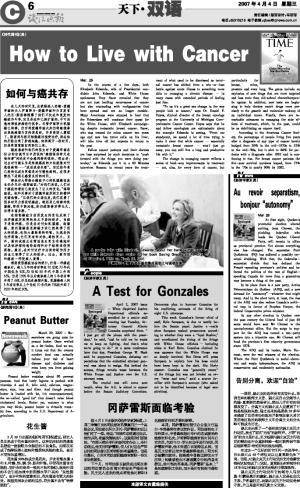Mar 29
At first sight, Quebec's provincial election altered nothing. Jean Charest, the plodding federalist who leads the Quebec Liberal Party, will remain in office as provincial premier. Yet almost everything else has changed. The separatist Parti Québécois (PQ) has suffered a possibly terminal drubbing. With that, the federalist-separatist divide that has defined the French-speaking province's politics and infected the politics of the rest of English-speaking Canada for more than a generation may become a thing of the past.
In its place there is a new party, Action Démocratique du Québec (ADQ), and a new demand for “autonomy”―whatever that might mean. And in the short term, at least, the rise of the ADQ may also redraw Canada's political map in favour of Stephen Harper, the federal Conservative prime minister.
In any other election in Quebec over the past century the Liberal haul of just 48 seats would have sent Mr Charest to the unemployment office. But the surge in support for the ADQ has turned a two-party system into a tripartite one. Mr Charest will head the province's first minority government since 1878.
The ADQ and its leader, Mario Dumont, were the real winners of the election. Where the Parti Québécois is social-democrat and wants independence, the ADQ is conservative and moderately nationalist.
告别分离, 欢迎“自治”
一眼看,魁北克的选举没有改变什么。单调乏味的联邦主义者、魁北克自由党领导人约翰·夏莱斯仍然是省长。然而几乎所有的事都改变了。分离主义的魁北克人党遭到了可能是彻底的失败。随之而来的是那条30多年来确定了法语省份的政治并影响加拿大其它英语地区政治的联邦主义和分离主义的分水岭可能成为历史。
魁北克出现了一个新的政党魁北克民主行动党,发出了要求“自治”的新呼声。不管“自治”的含义是什么,至少短期内魁北克民主行动党的崛起也许会重新描绘一幅对联邦保守派总理斯蒂芬·哈珀有利的政治地图。
在过去一个世纪的其它任何一次选举中,自由派只占48个席位足以让夏莱斯先生下岗。但是,对魁北克民主行动党的支持浪潮使得两党制变成了三党制。夏莱斯先生将领导自1878年以来魁北克首次出现的少数派政府。
魁北克民主行动党和它的领导人马里奥·杜蒙是真正的赢家。魁北克人党是社会民主派,并希望独立。而魁北克民主行动党是保守派,并且是温和的民族主义党派。

